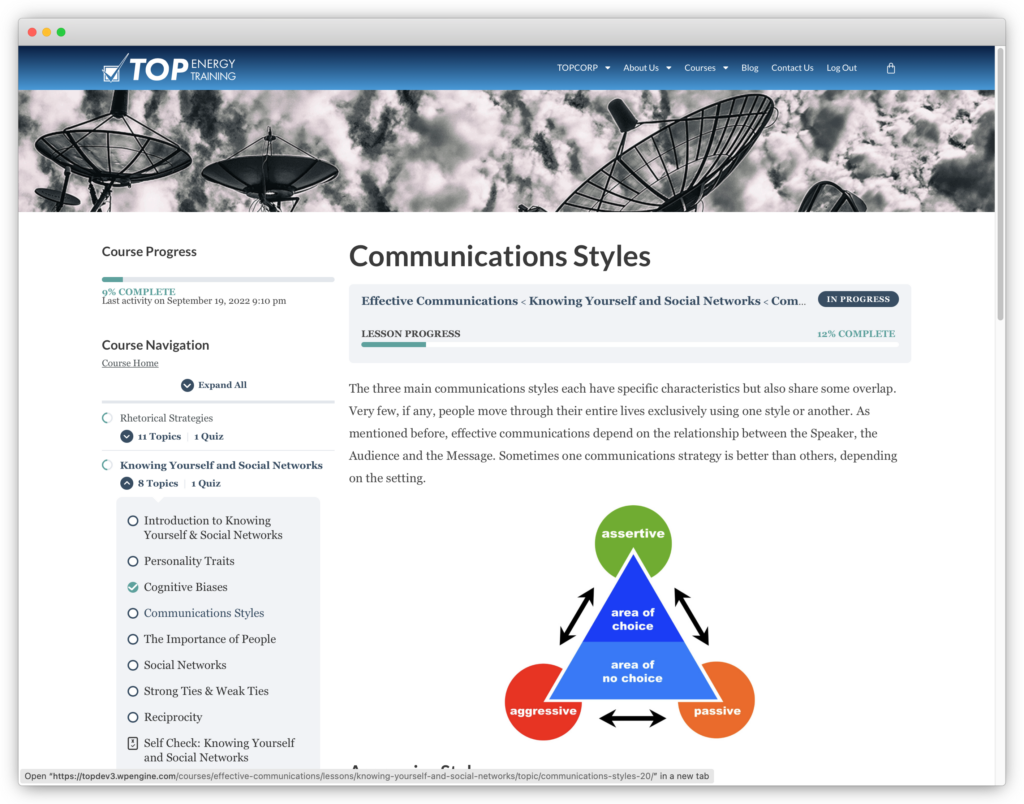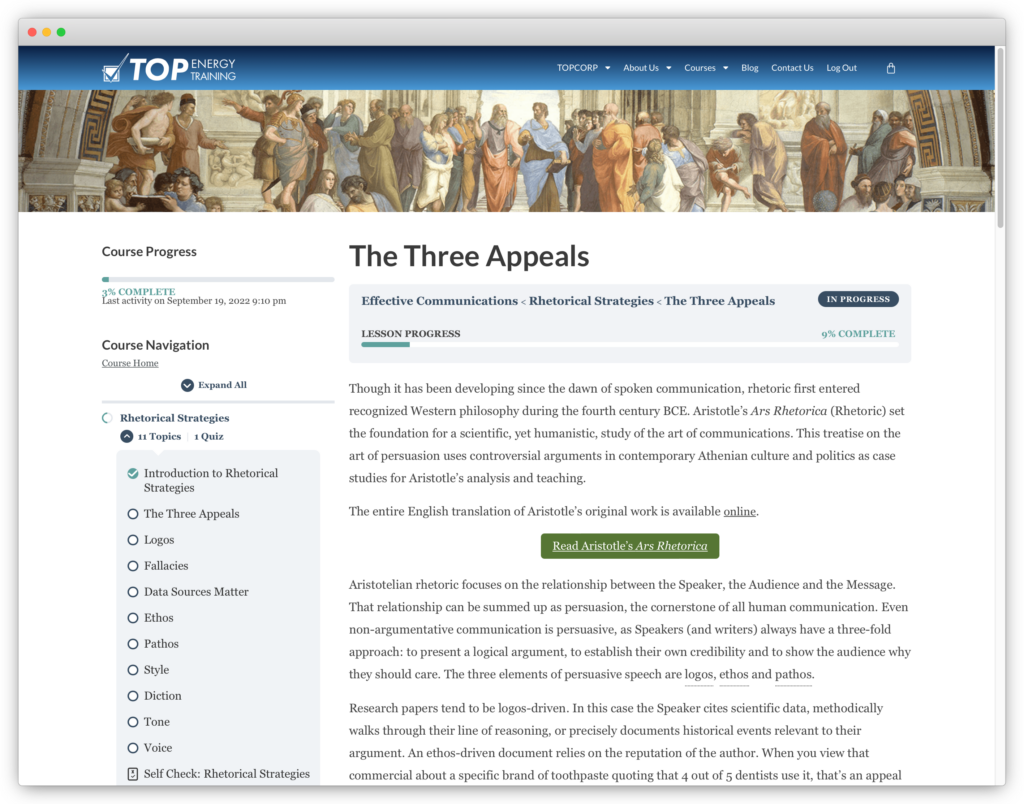Effective Communications: Full Course
3 Lessons • 29 Topics
Do you have business interests in the oil and natural gas industry? Maybe you’re looking to pursue a career in the industry? If so, you could benefit from TOP Energy Training’s online oil and gas training courses. We’ve designed our courses to educate students and industry professionals on the latest technology innovations, and we review our training courses regularly to stay up-to-date with the industry. The Effective Communications course contains three lessons designed to assist learners when conversing about topics related to the oil and gas industry.
Not sure you want to invest in an entire course? Certain popular lessons are available for individual purchase. Take one of the course lessons to try it out. Your lesson cost can later be applied to the purchase of the full course if you like.
Effective Communications Course Content Overview
The Effective Communications course starts with an explanation of Rhetorical Strategies detailing their historical significance and modern-day applications. The next lesson will guide you through how to navigate professional and social situations by helping you understand how people create, grow, and maintain relationships with each other in a social network, and the nature of different types of interpersonal relationships. The final lesson in this course will help you accomplish reconciliation and compromise in the event of miscommunications and conflicts.
In any professional energy career, effective communication skills and proper self-assessment will be critical in expressing and articulating ideas in a clean, concise, and well-constructed manner. The Effective Communications course can help you successfully converse about current topics and navigate the challenging, but essential, communication aspects of working in the oil and gas industry.
The online … training was straightforward, and I enjoyed the ability to cover the material at my own pace. Information was highly specific and has enabled me to excel in my current profession.
—Tammy Shelton, Lead Technician, Railroad Commission of Texas


Lessons from the course
Created in conjunction with TOP Energy Training’s highly qualified instructors, each lesson encompasses multiple topics to sharpen your knowledge and technical proficiency.

Rhetorical Strategies
11 Topics
Our Effective Communications course provides knowledge and training on rhetorical strategies through a mix of fundamental concepts and examples from the oil and gas industry. Rhetoric, in the broadest sense of the word, is the art of communicating. Firms selling a product, friends deciding which movie to see, and parents explaining the wonders of the world to their children all engage rhetorical skills in different ways to effectively reach their audience. These same skills apply within the energy sector. Government agencies disseminating information to the public, inspectors explaining activities to landowners, and companies explaining their emphasis on sustainability all need a good rhetorical tool kit to effectively communicate. An understanding of the fundamentals of rhetoric (1) improves your skills to communicate any message more effectively and (2) provides you with an ability to dissect and analyze the many messages all around us.

Knowing Yourself and Social Networks
8 Topics
Outside of the basic rhetorical strategies, good communication also depends on introspection and self-awareness. As you’ll learn, your communication style is a reflection of you. It’s important that you understand how personality traits, cognitive biases, and relationships with others all influence that style. This lesson emphasizes stakeholder communication within the energy sector. The final topic presents a case study on reciprocity and oil and gas regulatory agency response to a flood that impacted industry operations in Colorado.

Difficult Situations
10 Topics
No amount of careful planning and knowledge can completely eliminate the possibility of miscommunication and conflict. In difficult situations, it is best to take immediate steps to mitigate social fallout, resolve conflicts, and repair relationships. In the oil and gas industry, if a relationship sours, it’s not always possible to avoid the party in question – in fact, you may be required by your job to keep interacting with them regularly. Developing strategies to reach a point of reconciliation and compromise not only makes your day-to-day life more comfortable, but it also enables your organization to function and reach its goals more efficiently.
This lesson focuses on clarity, authenticity, and trust within the energy sector. The final topic looks at a case study of the Horse River Wildfire in Canada and the ability for industry, regulatory agencies, and communities to manage a crisis in the Athabasca oil sands operation area through trust.
Each lesson has a self-assessment at the end to reinforce the information and prepare you for the next lesson.
Who Should Take This Course?
Professionals working in a variety of energy-related careers (e.g., engineers, geoscientists, attorneys, accountants, managers, regulatory personnel, policymakers) know how important it is to stay current and up-to-date with the latest technology and advancements in the oil and gas sector. Students have a critical need to gain a solid foundation of industry fundamentals and distinguish their future college and/or employment applications. Educators want to present a broad perspective of the technical solutions within the oil and gas industry to their students, highlighting the diverse nature of careers and opportunities within the energy sector.

